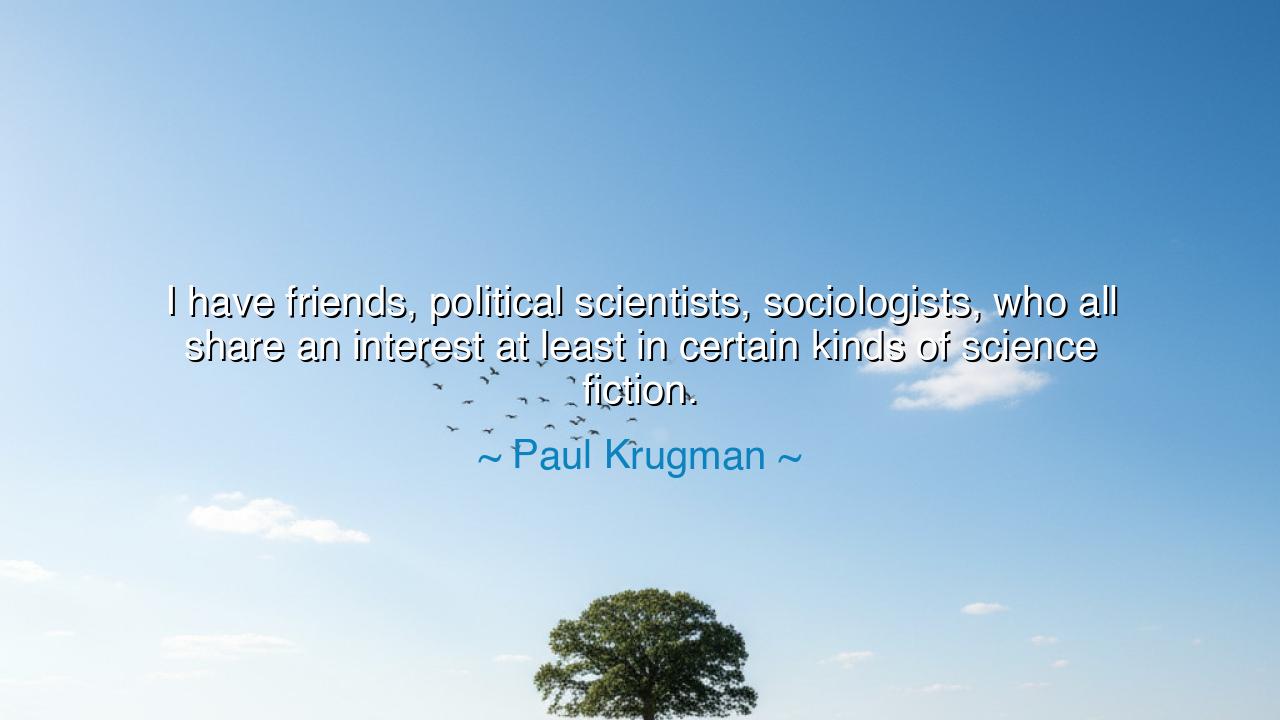
I have friends, political scientists, sociologists, who all share
I have friends, political scientists, sociologists, who all share an interest at least in certain kinds of science fiction.






Hear now, O seekers of wisdom, the words of Paul Krugman: "I have friends, political scientists, sociologists, who all share an interest at least in certain kinds of science fiction." These words open the door to a profound reflection on the intersection between the worlds of thought—the domains of politics, society, and science fiction. Krugman speaks of an unexpected yet powerful connection between fields that seem, at first glance, far apart. The social sciences and science fiction, while different in method and purpose, share a common thread: both seek to understand and reshape the world, and both, in their own ways, attempt to glimpse the future of humanity.
In the ancient world, the philosophers and thinkers often saw their work as more than mere academic pursuit. To Socrates, Plato, and Aristotle, knowledge was the key to unlocking the future of society and the individual. They questioned not just the nature of the world around them but sought to understand how humans could live together in harmony, how society could thrive, and how power could be justly wielded. Plato, in his "Republic," envisioned an ideal society that could transcend the corruption and flaws of the physical world. Much like science fiction, these philosophical inquiries were imaginations of a better future—a future guided by wisdom and reason. Similarly, Krugman's words echo the idea that even those immersed in the study of human society, like political scientists and sociologists, can find wisdom in the speculative realms of science fiction.
Consider, O wise ones, the works of H.G. Wells, one of the founding fathers of science fiction. In his books, such as The Time Machine and The War of the Worlds, Wells did not merely create worlds of fantasy; he used science fiction to comment on society, to reflect on humanity’s potential and its flaws. Wells's exploration of time travel in The Time Machine was not just a thrilling adventure—it was a meditation on the social inequalities of his time, a critique of the classes and the consequences of industrialization. Through his lens of fiction, he invited readers to think critically about their present world and the future they were creating. Much like Krugman’s friends—political scientists and sociologists—Wells was deeply concerned with the forces that shape society, and he used the speculative world of science fiction to pose difficult questions about where those forces might lead.
This same ability to use science fiction to shape thought and provoke social reflection can be found in the work of Isaac Asimov, whose Foundation series laid out complex ideas about the rise and fall of empires, the nature of power, and the science of psychohistory—a blend of mathematics and psychology to predict the future of entire civilizations. Asimov's speculative work transcended the fictional; it was an inquiry into the predictability of human behavior and the mechanics of society. Just as Krugman points to the shared interest between social scientists and science fiction writers, Asimov’s work exemplifies how the speculative realm can illuminate the workings of real-world systems, revealing patterns and forces at play in society.
Krugman's statement underscores the power of science fiction as a tool for understanding society. Political scientists and sociologists—whose task it is to analyze and critique the forces that shape human society—often turn to science fiction as a means of thinking outside the constraints of the present moment. In the world of science fiction, they can imagine new systems of government, new forms of social interaction, and new technologies that challenge existing power structures. Just as Plato used the allegory of the cave to critique the nature of perception and reality, so too do science fiction writers like Margaret Atwood or Ursula K. Le Guin create worlds that reflect the flaws and potential of current systems, allowing us to see the world as it could be, not just as it is.
The lesson, O wise ones, is one of expansion and imagination. The social sciences are not confined to the study of the present moment or the analysis of historical data alone; they are a pathway to understanding what could be. Through science fiction, we are granted a vision of possible futures, a space to explore alternative realities and solutions to the challenges we face. Krugman reminds us that the future is not just something we stumble into—it is something we shape, through thought, action, and creativity. The realms of politics, society, and science fiction do not exist in isolation from each other but are deeply interconnected.
Thus, in your own lives, O seekers, let us take a page from the works of the great thinkers of the past and the speculative authors of today. Use the tools of imagination and critical thinking to explore not only the world as it is but the world as it could be. Let science fiction be a space where you challenge the assumptions of today and imagine the possibilities of tomorrow. Whether in the realm of politics, economics, or society, the speculative world offers us the chance to engage deeply with the forces that shape our reality. Through this, we may find the courage to create a future that transcends the limitations of the present, one that is built on wisdom, compassion, and a shared vision of what humanity can become.






AAdministratorAdministrator
Welcome, honored guests. Please leave a comment, we will respond soon